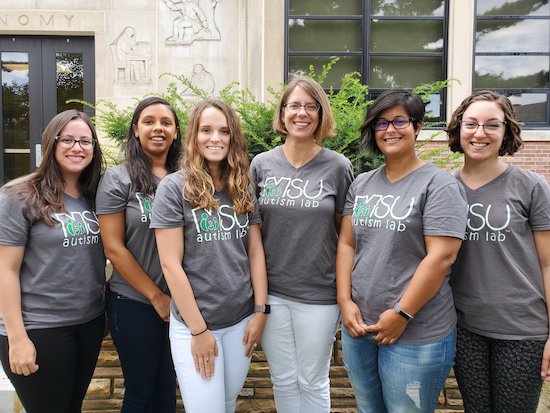Social distancing highlights the importance of telehealth and parent-coaching models for children with autism
April 5, 2020 - Caroline Kraft
As the majority of Americans are engaged in social distancing, parents and caregivers of children with autism must learn how to provide their children with the best support possible without their typical services at school and therapy centers.
Research suggests that parent-coaching is ideal for supporting children with autism and other developmental disabilities because it enables parents to facilitate their children’s learning outside of therapy sessions and across different contexts. In addition to supporting children’s developmental outcomes, parent-coaching models have been shown to reduce parent stress and improve parent-child relationships.
 Karís Casagrande, a 6th year doctoral student in Clinical Psychology and member of MSU’s Autism Lab, says parent-coaching programs like Project ImPACT help families function better because parents learn the unique skills necessary for supporting children on the autism spectrum when problems arise. “This is really specialized knowledge,” Casagrande says.
Karís Casagrande, a 6th year doctoral student in Clinical Psychology and member of MSU’s Autism Lab, says parent-coaching programs like Project ImPACT help families function better because parents learn the unique skills necessary for supporting children on the autism spectrum when problems arise. “This is really specialized knowledge,” Casagrande says.
Parents and children in Project ImPACT meet with their coach on a weekly or bi-weekly basis. At each meeting, the coach teaches the parent a new skill and provides coaching and feedback while observing parents as they practice with their child. The coach also helps parents set goals for their children and identify strategies to meet their children’s needs.
“We ask parents, what is important you? What do you want to learn? I am going to empower you to learn and understand how [we] do what we do so you can learn how to do it and make it part of your routine,” Casagrande says.
The MSU Autism Lab, lead by Dr. Brooke Ingersoll, has been exploring telehealth as a potential alternative to in-person meetings for delivering Project ImPACT training. Using telecommunication technologies, coaches can observe and interact with parents remotely. Telehealth is particularly useful in states that have many rural areas because it connects families to services when they cannot physically attend them. Telehealth methods also reduce the time commitment for families who live several miles from ABA centers and have schedule conflicts.
Now that the state of Michigan is under a shelter-in-place order, many professionals are relying on telehealth to support their clients. The lab is continuing their outreach by hosting webinars for providers who have been training in Project ImPACT. They are also hosted another open training session on Friday that focuses on transitioning to telehealth for effective parent-coaching.
“We are trying to support the community in making this transition way earlier than we had anticipated.”
For those interested in learning more about parent coaching and telehealth for parents of children with autism, the MSU Autism Lab has resources on their website (https://psychology.psy.msu.edu/autismlab/telehealth_resources.htm) and recently gave a free webinar (https://www.youtube.com/watch?v=ZuaCS19djPw).

